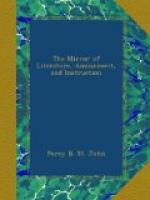substance exhausted, exerted their utmost cunning to
regain it; pretending that they had found some relics
of the ancient martyrs or apostles, or some object
relative to the life or death of our Saviour.
By these means an immense number of persons, excited
by religious curiosity, repaired to the places where
these objects were exposed, and the churches and the
provinces of which became enriched by them. With
the same motive, in the year 1008, a portion of the
rod of Moses was discovered in France, which attracted
a vast number of visiters, both from that country
and Italy. In 1014, some monks, on their return
from a pilgrimage to Jerusalem, brought with them
a part of the napkin with which our Saviour wiped
the feet of the apostles at the Last Supper; and,
in order to prove its authenticity, they passed it
uninjured through the flames. This kind of miracles,
which were in such favour with the ignorant multitude
in those days, produces no effect, since chemical
science has enabled us to penetrate into the hidden
secrets of nature; and if history is diligently examined,
we shall perceive that the human mind was occupied
in the discovery of that science at this period.
The alchemists perhaps, although persecuted as the
followers of the devil, were not altogether extinct,
and still read some books which laid open the discoveries
of the ancient Greeks and Romans. The commercial
cities of Italy, in communication with the East, acquired
extraordinary knowledge, of which they availed themselves
disadvantageously to the morality and piety of the
Christian church. About this time, too (the year
1000), the epoch at which, according to prediction,
the world was to be at an end, men began to make fresh
researches, and to build new churches, to repair the
old ones, and to invent novelties. The prophecy
of Daniel, which says, “Tempus, tempora, dimidium
temporis,” proving by experience to be inapplicable
to the interpretation which the monks and ecclesiastics
had generally given it, produced a new energy in the
human mind: and if at first, the wealth of the
churches were aggrandized by profuse largesses, we
shall hereafter see them struggling to preserve it.
A disposition also to study was now induced:
and a certain Guido, a monk of Pomposa, being called
to Rome as a music-master, whilst very young, invented
the scale or gamut of C notes, which was then esteemed
miraculous.[4] Happily for him the matter took this
turn; for otherwise he would have suffered death.
The religious superstition was so strong, that any
unusual effects of human nature were attributed to
diabolical operations; and, in such instances, the
reputed authors were either beheaded or burnt.
Such was the fate of an unhappy wretch who had discovered
the secret of making glass malleable. This sublime
genius made a goblet of this glass; and, being conducted
into the presence of Henry, in 1022, he threw it on
the ground, when, instead of breaking, it bent, and
suddenly resumed its original shape. The ignorant
emperor, believing him to be possessed with the devil,
ordered him to be beheaded.—Life of Gregory
VII. By Sir Roger Greisley, Bart.




